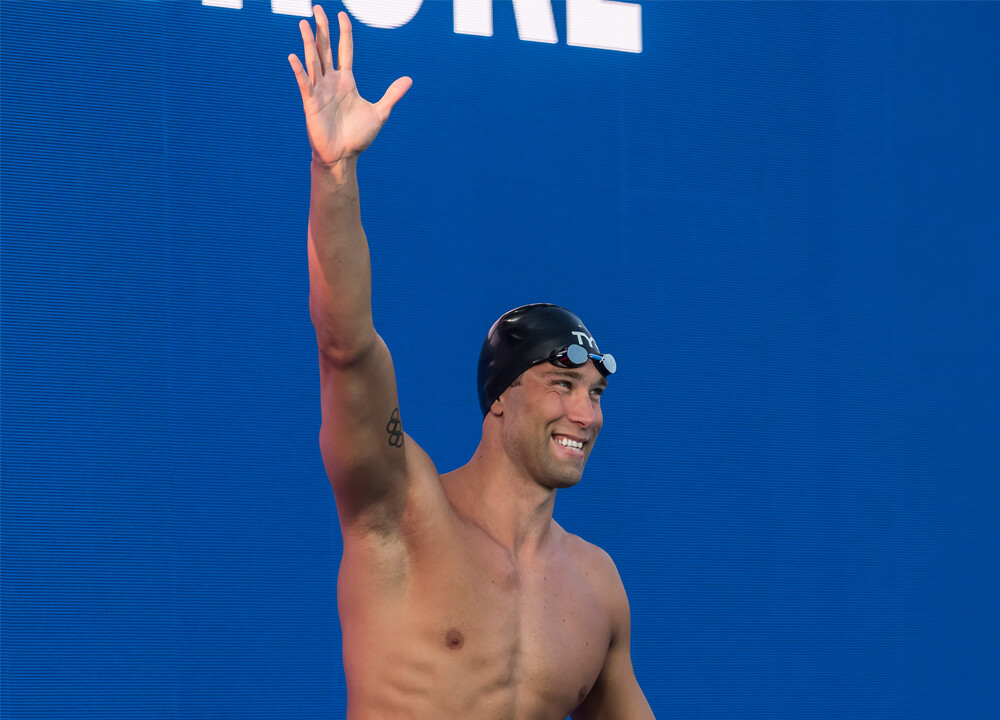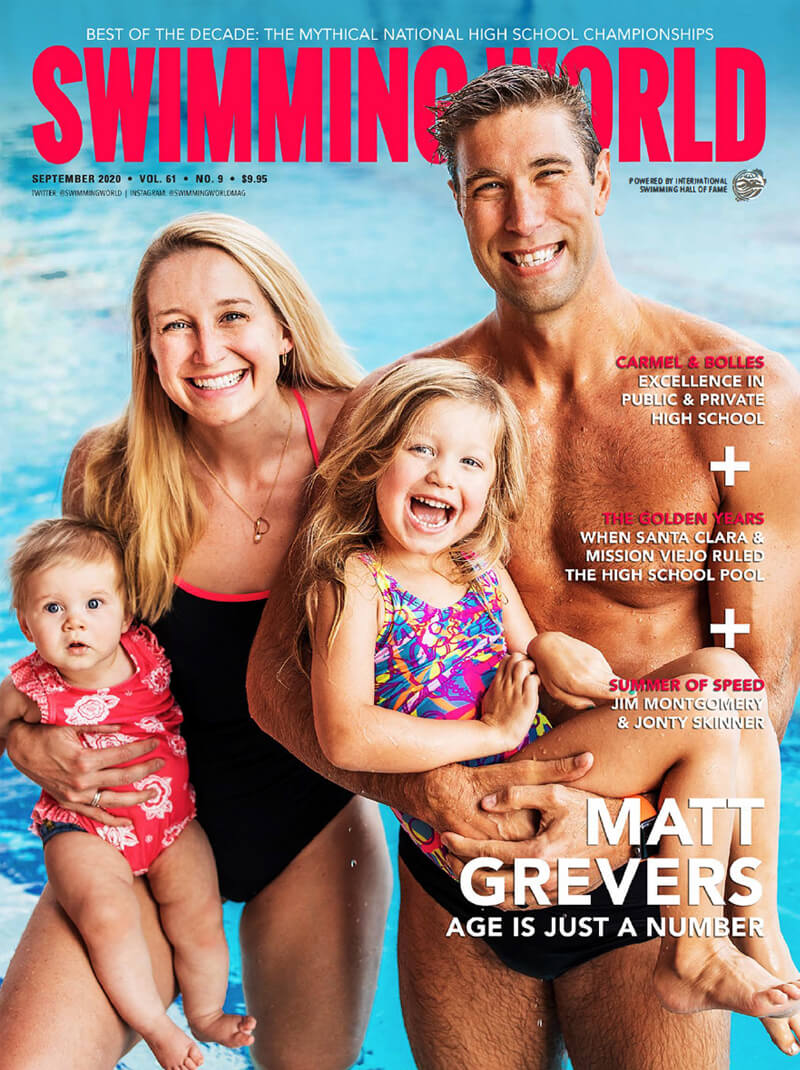Swimming World Presents – Matt Grevers: Still Chasing Excellence

Swimming World Presents – Matt Grevers: Still Chasing Excellence
The latest issue of Swimming World Magazine
is now available for download in the Swimming World Vault!
Non-Subscribers Can Download This Issue Here
Matt Grevers: Still Chasing Excellence
By John Lohn
Matt Grevers does not need to achieve anything more to stamp himself as an all-time great. But even at 35, there is a desire to accomplish more, and there is no reason to doubt Grevers can come through.
One day, Matt Grevers will stand in front of a ballroom filled with the biggest names in the history of the sport. His family and friends will look on, too, as he delivers a speech accepting induction into the International Swimming Hall of Fame. Afterward, a permanent exhibit honoring his career will be displayed in the Hall of Fame’s state-of-the-art complex.
When that day will be is uncertain. See, here’s the catch to that impending celebration: Grevers, 35, a Northwestern University graduate and Team USA stalwart, is still competing at a world-class level, continuing to pursue his dreams in the same way he did more than a decade ago.
Initially, this past summer was supposed to mark Grevers’ latest pursuit of Olympic success. Of course, the COVID-19 pandemic altered those plans, postponing the 2020 Tokyo Games and delaying Grevers’ chase—and the dreams of thousands of other athletes across a multitude of sports. Consequently, 2021 has become the target: the United States Olympic Trials in Omaha, where Grevers will get the chance to earn a third Olympic invitation.
A multi-time NCAA champion at Northwestern, Grevers made his presence known on the international stage at the 2008 Olympic Games in Beijing. While Aaron Peirsol repeated as the gold medalist in the 100 backstroke, Grevers provided the United States with a sweep of the top two positions, the silver medal draped around his neck on the podium.
Four years later, Grevers played the role of an alchemist, as he turned silver into gold by besting the competition in the 100 backstroke at the 2012 Olympics in London. The event once again produced a U.S. sweep, with Nick Thoman claiming silver behind Grevers, and marked the fifth straight Games in which an American won the event. That streak was extended to six consecutive Games when Ryan Murphy prevailed in 2016.
Along the way, Grevers has collected four Olympic medals for his relay contributions (three gold and a silver) and has won 13 medals (six gold, five silver and two bronze) at the World Championships (LC), including an individual title in his signature event in 2013. As important, he is one of the most well-liked athletes on the deck—and one of the most respected, having served as a Team USA captain at multiple international competitions.
“I’m one of the fortunate ones to have stayed on top for so long,” Grevers said. “I love working out for a living, and being a professional swimmer is an excuse to live a healthy and clean life. It gives me a reason to focus on my body and my performance. Some people view what we do as a sacrifice. I view it as the lifestyle I want. I love what I do.”
After Grevers just missed out on the Rio Olympics, his wife, Annie, wrote an article for Swimming World that spoke volumes about the support her husband would receive, and about the pride she held for his efforts. “Swimmers either spiral into a free fall or find a way to land with both feet on the ground,” Annie Grevers wrote in 2016.
“My husband landed firmly. He faced pained expressions conveying genuine sympathy from coaches, fellow athletes and fans. He talked to the media, he smiled for photos with kids, he toasted and laughed with us at a family dinner. He remained Matt. He remained joyful. It’s not that he didn’t suffer, but he did so with grace that comes from a divine place.”
The COVID-19 pandemic has not been easy for anyone. The impact has been felt at varying levels, and Grevers is no different. With the shutdown of many facilities, including the University of Arizona’s pool, where he typically trains under Coach Jesse Stipek, Grevers has been forced to scramble for pool time.
He has utilized four pools during the pandemic and has been pinched by time limitations that do not allow for workouts to be as intense or complete as normal. But he’s made the best of the situation and did get in a two-week training stint at the University of Missouri, where his brother, Andrew, is the head coach.
Because the Olympic Trials and Olympic Games have been delayed a year, athletes will be impacted in different ways. For up-and-comers, the opportunity to develop for another year might be an advantage. For someone like Grevers, the delay can be viewed as an impediment, since he is not getting any younger.
“During this year, (as former coach Rick DeMont says), ‘We’re going to work on landing the plane,’” Grevers said. “I felt I was in a good spot, and this is an opportunity to have some more time. I’m going to be a year older, and being 36 is not going to help physiologically. My body doesn’t recover like it used to. But I’ve ignored injuries and emotional distractions in the past, and I like thinking in the moment. I’m getting naturally stronger with age and maybe I can sharpen up a few things.”
With Grevers as one of the main protagonists, the 100 backstroke will be a can’t-miss event at Trials next summer. Murphy, the reigning Olympic champ, will be in the field, along with standouts such as Jacob Pebley, Justin Ress, Coleman Stewart and Shaine Casas. All are capable of producing a time worthy of the Olympic final.
To read more about how Matt Grevers is staying sharp for the postponed Tokyo Olympics,
Check out the full article in September’s issue, available now!
 [PHOTO CREDIT: TAYLOR NATIONS]
[PHOTO CREDIT: TAYLOR NATIONS]
Get Swimming World Magazine and Swimming World Biweekly FREE When You
Become A Member of the International Swimming Hall of Fame
New! 30 Day Membership to ISHOF AND Digital Swimming World Subscription for just $10 a month!
Want more? Get a 1 Year ISHOF Family Membership With Swimming World Print AND Digital Subscription Order Now!
Non-Subscribers can click here to download this issue for only $5.94
Swimming World Magazine September 2020 Issue
FEATURES
010 IN A CLASS OF ITS OWN
by Dan D’Addona
Indiana’s Carmel High School has won the girls’ state swimming and diving championships for 34 straight years, a feat unequaled by any other high school—not only in swimming, but in any other sport.
012 BEST OF THE DECADE (2010-19)
In Swimming World’s first mythical national high school championships to determine the best teams of the last decade, Carmel High School of Indiana won both the girls’ and boys’ competitions.
013 GIRLS’ NATIONAL HIGH SCHOOL CHAMPIONSHIPS MOCK HEAT SHEET: BEST OF THE DECADE (2010-19)
Times compiled by Bob Klapthor
015 BOYS’ NATIONAL HIGH SCHOOL CHAMPIONSHIPS MOCK HEAT SHEET: BEST OF THE DECADE (2010-19)
Times compiled by Bob Klapthor
017 PREP POWER
by Andy Ross
Since Swimming World first began recognizing the top high school teams in the country in 1971, The Bolles School of Jacksonville, Fla., has won 18 national prep school titles—10 boys’, eight girls’. The Bulldogs have also captured 12 combined championships (public and independent schools), with both teams finishing No. 1 six times.
020 THE GOLDEN YEARS OF HIGH SCHOOL SWIMMING
by David Rieder
Public schools Santa Clara and Mission Viejo built high school swimming dynasties from the 1960s through the early 1980s. Not only did they dominate high school swimming, but unlike today, they also produced many of the swimmers from that era who competed in the Olympics.
026 STILL CHASING EXCELLENCE
by John Lohn
Matt Grevers does not need to achieve anything more to stamp himself as an all-time great. But even at 35, there is a desire to accomplish more, and there is no reason to doubt Grevers can come through.
029 SUMMER OF SPEED
by John Lohn
Politics interfered at the 1976 Montreal Olympics, preventing South Africa’s Jonty Skinner from competing head-to-head against the USA’s Jim Montgomery in the men’s 100 freestyle. But that summer, they became the first two swimmers to break the 50-second barrier in the event, with Montgomery clocking 49.99 at Montreal, followed by Skinner with a 49.44 at the AAU National Championships three weeks later.
032 THE TROUBLE WITH SPRINTERS (Part 3): GARY HALL JR.
by Bruce Wigo
The theme of this series of articles has been that sprinters are different from other swimmers—athletes who have historically been considered troublemakers by the establishment, but who have been great for the sport. This month’s featured sprinter is Gary Hall Jr.—one of the greatest in Olympic history…but, perhaps, one of the most maligned and misunderstood.
COACHING
038 SWIMMING TECHNIQUE CONCEPTS: TRUST IN SCIENCE
by Rod Havriluk
Based on the many counterproductive technique elements that are conventional wisdom, it seems logical to ask why there is not a greater acceptance of science in swimming. The purpose of this article is to give swimmers and coaches some very real reasons to trust in science and scientists.
040 SPECIAL SETS: BACK TO BASICS
by Michael J. Stott
While college swimming as we know it faces a roadmap unlike any in recent memory, Coach Eric Skelly of the University of the Cumberlands, Ky. is treating the return to campus and formal practice as business as usual.
043 Q&A WITH COACH SION BRINN
by Michael J. Stott
044 HOW THEY TRAIN TAYLA LOVEMORE
by Michael J. Stott
TRAINING
036 DRYSIDE TRAINING: MORE CORE
by J.R. Rosania
JUNIOR SWIMMER
046 UP & COMERS: GABI BRITO
by Shoshanna Rutemiller
COLUMNS
008 A VOICE FOR THE SPORT
023 DID YOU KNOW? JIM CROW
037 THE OFFICIAL WORD
042 MOMS AT MEETS
047 GUTTERTALK
048 PARTING SHOT
Swimming World is now partnered with the International Swimming Hall of Fame. To find out more, visit us at ishof.org



